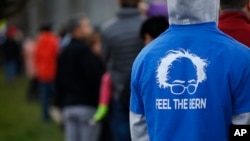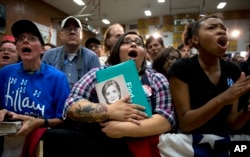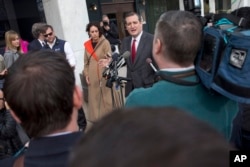Voters in three western U.S. states went to the polls Tuesday for presidential nominating elections, with the leading contenders, Republican Donald Trump and Democrat Hillary Clinton, looking to boost their leads in the race to win their parties' nominations.
Political surveys indicate Trump, the brash billionaire political novice, appears set to win in Arizona, along the U.S.-Mexican border, over his two remaining rivals, Texas Senator Ted Cruz and Ohio Governor John Kasich. A total of 58 delegates to the party's July national nominating convention are at stake in a winner-take-all primary.
The outcome appears more in doubt in Utah, a heavily Mormon state. Pre-election polls show Cruz in the lead, but he can only claim all 40 delegates at stake if he gets more than half the vote at party caucuses. Otherwise, the delegates will be split according to the vote count.
US Presidential Candidate Delegate Count
Delegate Count
Here is an estimated delegate count for each candidate:
Republicans
Donald Trump: 740
Ted Cruz: 514
John Kasich: 143
Democrats
Hillary Clinton: 1,743
Bernie Sanders: 1,056
Total delegates needed for party nomination:
Democrats: 2,383
Republicans: 1,237
* As of April 5, 2016
In the Democratic contest, the polls show that Clinton, a former U.S. secretary of state, is poised to win the primary election in Arizona, but is engaged in close caucus contests with her sole challenger, Vermont Senator Bernie Sanders, in both Utah and Idaho.
If both eventually secure their parties' presidential nominations, Trump, a one-time television reality show host, and Clinton, the wife of former U.S. President Bill Clinton, would face each other in the November election, with the winner replacing President Barack Obama as he leaves office in January 2017.
Attacks in Brussels
Tuesday's voting was taking place in the hours after the deadly terrorist attacks at the airport in the Belgian capital of Brussels and at a subway station not far from the European Union headquarters.
Trump, who called for a temporary ban on Muslims entering the U.S. after previous attacks linked to Islamic terrorists, said he had warned about new assaults.
"Brussels was a beautiful city, a beautiful place with zero crime, and now it's a disaster city," Trump said.
Kasich said the global community must "redouble" its efforts to "identify, root out and destroy the perpetrators of such acts of evil."
Cruz declared that "radical Islam is at war with us," and said that if he is elected president, he would unleash the "full force and fury" of the U.S. military to defeat Islamic State jihadists.
Clinton said the U.S. must "stand in solidarity" with European allies in fighting terrorism. "We've got to be absolutely strong and smart and steady in how we respond," she said.
Sanders declared, "This type of barbarism cannot be allowed to continue," saying the attack was a "brutal reminder that the international community must come together to destroy" Islamic State.
Republican battle
The Republican contest in Utah is a microcosm of the efforts by Cruz and Kasich to keep Trump from moving closer to the 1,237 Republican convention delegates he needs to clinch the presidential nomination before the quadrennial gathering convenes. His opponents want to keep him under that threshold and instead throw the convention to an open vote.
The party's 2012 nominee, Mitt Romney, said he is voting for Cruz on Tuesday and urged others to do the same, adding that supporting Cruz is the only way to get to the open convention and stop Trump. Last week, Romney endorsed Kasich before the Ohio governor won the winner-take-all primary in his home state, thus denying Trump a big haul of delegates in the Midwestern state.
After Tuesday, Republicans have just two contests over the next three weeks: in the Midwestern state of Wisconsin on April 5, and in the western state of Colorado on April 9.







